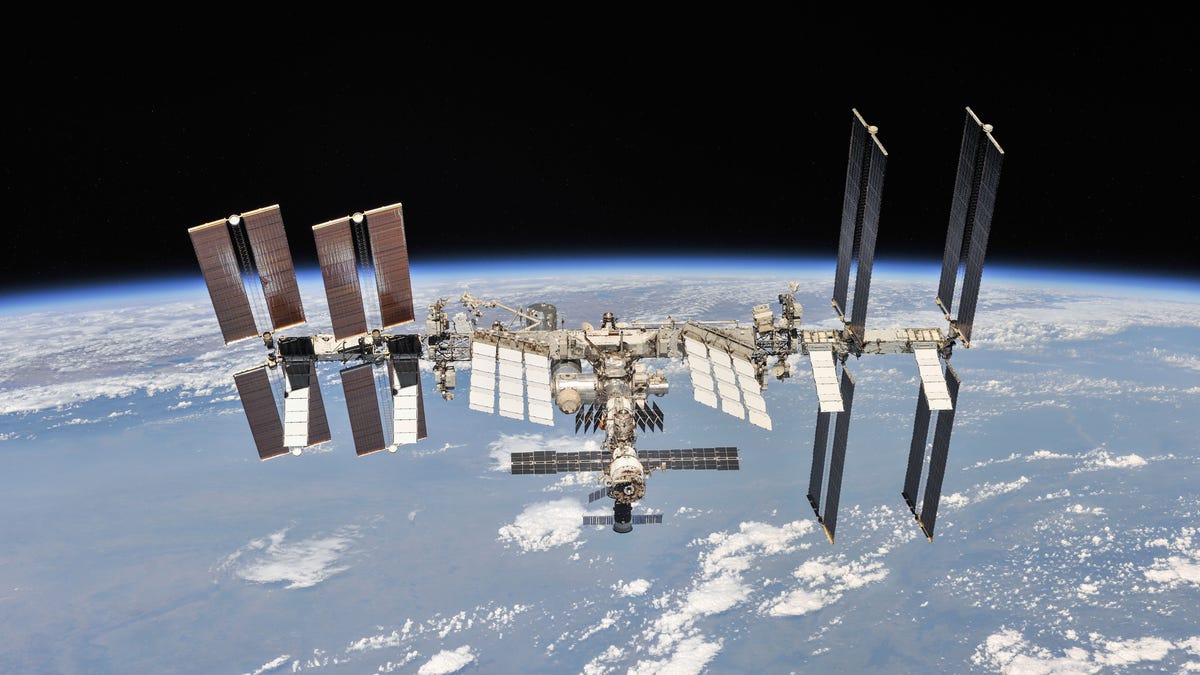'Reckless' Russian missile test blows up satellite, forcing ISS astronauts to take shelter
The US State Department condemns the action, and NASA administrator Bill Nelson calls it "irresponsible" and "destabilizing."

The ISS faced orbital obstacles Monday.
Seven crew members aboard the International Space Station had to take emergency shelter in a spacecraft docked to the ISS on Monday because of a new, potentially dangerous debris field generated by a Russian anti-satellite test.
The astronauts huddled inside the SpaceX Crew Dragon and Russian Soyuz spacecraft after a Russian missile exploded one of the nation's dead spy satellites over the weekend.
The anti-satellite test was condemned by the US State Department on Monday. "The Russian Federation recklessly conducted a destructive satellite test of a direct ascent and anti-satellite missile against one of its own satellites," State Department spokesperson Ned Price told reporters.
The test created over 1,500 pieces of new junk in orbit that "will significantly increase the risk to astronauts and cosmonauts on the International Space Station, as well as other human spaceflight activities," Price said.
Price's statement confirmed earlier reports from the US Space Command of a "debris-generating event in outer space," which CNN first reported was suspected by US officials of coming from a Russian weapons test.
NASA administrator Bill Nelson also weighed in, saying he was outraged by the "irresponsible" and "destabilizing" action.
"With its long and storied history in human spaceflight, it is unthinkable that Russia would endanger not only the American and international partner astronauts on the ISS, but also their own cosmonauts. Their actions are reckless and dangerous, threatening as well the Chinese space station and the taikonauts on board," Nelson said in a statement.
The cloud of debris resulting from the test could be similar to the one left behind by a Chinese weapons test conducted in 2007 and linger in low Earth orbit for years. Just last week the ISS dodged space junk from the 2007 test.
Private space debris tracking company LeoLabs also reports that its radar data "confirm detection of multiple objects near expected location of Cosmos 1408." Cosmos 1408 (sometimes referred to as Kosmos-1408) is a long-defunct Russian spy satellite launched in 1982.
With new data from Kiwi Space Radar gathered at 1620 UTC, we confirm detection of multiple objects near expected location of Cosmos 1408. We will share supporting data as we gather it today.
— LeoLabs, Inc. (@LeoLabs_Space) November 15, 2021
"I would expect thousands of pieces of cataloged debris from a satellite the size of Kosmos-1408," said Harvard astronomer and leading satellite watcher Jonathan McDowell on Twitter.
I would expect thousands of pieces of cataloged debris from a satellite the size of Kosmos-1408 (Ikar satellites are about 1750 kg)
— Jonathan McDowell (@planet4589) November 15, 2021
The Russian space agency, Roscosmos, said in a statement to Russian news agency Tass that "the orbit of the object due to which the crew had to move to the spaceship as per routine procedure, has moved away from the orbit of the ISS, the station is in the green zone."
The astronauts on the ISS have returned to the main station but continue to work with NASA to monitor the debris cloud and have modified their sleeping arrangements out of an abundance of caution, according to transmissions with mission control in Houston.



